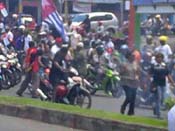Geneva Appeal on West Papua
Am 15. Juni, gegen 09:00 Uhr, war es auf dem Gelände des Militärkommandoposten Kodim 1705 zu einer Demonstration von Zivilsten gekommen. Sie protestierten gegen das brutale Vorgehen von fünf Militärangehörigen, die am 14. Mai den indigenen Papua Derek Adii getötet haben sollen.
Familienangehörige und Freunde des Ermordeten forderten bei dem Protest eine Aufklärung des Verbrechens und die strafrechtliche Verfolgung der Täter. Dabei kam es zu gewalttätigen Übergriffen zunächst von Seiten der Demonstranten, die Fensterscheiben des Militärstützpunktes zerschlugen und mit Gegenständen warfen.
Yones Douw, der zur Beobachtung des Protests vor Ort war, lief auf das Militärgelände, um die aufgebrachte Menge zu beruhigen. Die Demonstranten sollen daraufhin gemeinsam mit Yones Douw das Gelände verlassen haben.
Das Militär reagierte nun seinerseits mit Gewalt: Soldaten feuerten Warnschüsse ab und begannen, auf offener Straße auf Demonstranten einzuschlagen. Dabei hatten sie vor allem den in der Öffentlichkeit bekannten Menschenrechtsverteidiger Yones Douw im Visier.
Mindestens fünf Soldaten sollen mit Holzlatten auf Yones Douw eingeschlagen und ihm Verletzungen an Kopf, Schulter und Handgelenken zugefügt haben. Auch der Vater des Ermordeten Derek Adii, Damas Adii, wurde durch Militärangehörige mit Holzlatten attackiert. Während Yones Douw geschlagen wurde, hörte er die Soldaten sagen: „Diesen Tieren muss eine Lektion erteilt werden“ und „Tötet die Leute einfach“. Eine ärztliche Versorgung soll Yones Douw anschließend im Krankenhaus untersagt worden seien, da das Personal für die medizinische Behandlung einen Brief der Polizei verlangt habe.
Yones Douw leidet seitdem vor allem unter Kopfverletzungen und ist besorgt um seine Gesundheit und Sicherheit. 2009 war er bereits Opfer polizeilicher Gewalt gewesen.
Menschenrechtsorganisationen und Kirchen Papuas verurteilen die Gewalt an Yones Douw und anderen Menschenrechtsverteidigern in Papua. In einer gemeinsamen Presseerklärung vom 17. Juni 2011 fordern sie explizit den Schutz von Menschenrechtsverteidigern durch den indonesischen Staat.
Amnesty International hat in einer Eilaktion (Urgent Action) dazu aufgerufen, zum Schutz von Yones Douw Briefe an die indonesischen Behörden zu schicken. Wer sich an der Aktion beteiligen möchte, kann bei der Koordinationsstelle des West Papua Netzwerkes weitere Informationen und einen entsprechenden Musterbrief anfordern.
Kristina Neubauer
(Q.: Amnesty International: UA:188/11 Index:ASA 21/014/2011 Indonesia, 17.06.2011; Sekretarias Biro Keadilan dan Perdamaian Klasis Nabire; Siaran Pers Bersama Koalisi Para Pembela HAM di Tanah Papua „Jaminan Perlindungan Pembela HAM…?).

